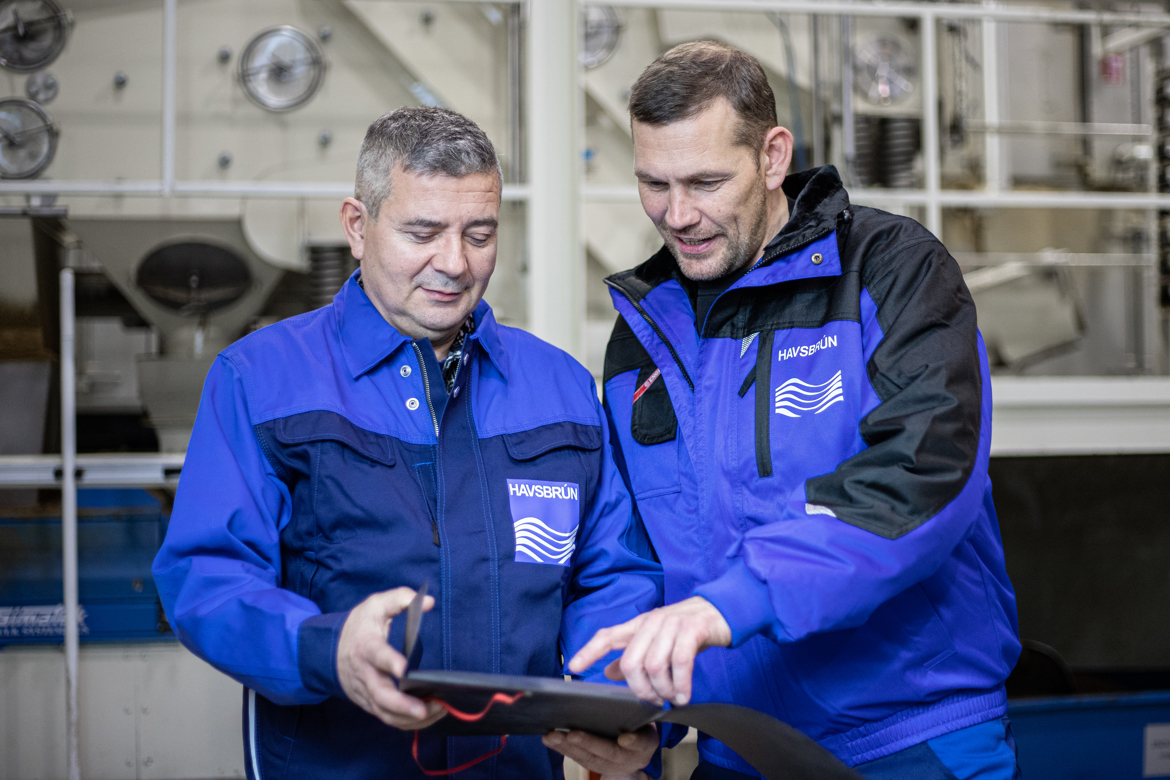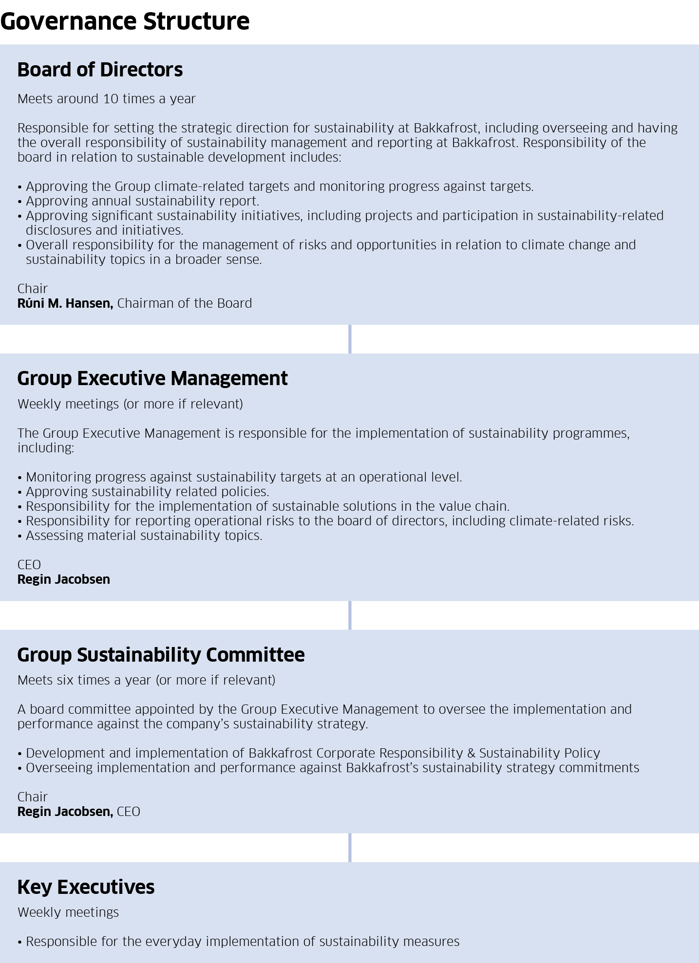Sustainability Governance
Read more on how we ensure sustainability is embedded throughout the organisation.

This policy applies to all Bakkafrost operations and outlines the company’s approach to sustainability governance, including the highest governance body’s involvement in sustainability management
Sustainability is at the heart of everything we do. Through our sustainability strategy, the Healthy Living Plan, which comprises our five Group Sustainability pillars Healthy Business, Healthy People, Healthy Salmon, Healthy Environment and Healthy Communities, we have set ambitious goals and targets to drive sustainable development in the organisation.
Through our Sustainability Governance Framework, we ensure that we have the organisational capability to implement measures necessary to achieve our sustainability goals, including integration of sustainability in business strategies and high-level decisions. In addition, the governance framework ensures that we manage sustainability-linked risks in an effective and responsible manner.
GOVERNANCE STRUCTURE

RESPONSIBILITY FOR MANAGING IMPACTS
The Bakkafrost Board of Directors oversees and has the overall responsibility of the sustainability management and reporting.
The Board of Directors has delegated the day-to-day responsibility for managing the organization’s sustainability-related impacts to the CEO. However, major decisions and investments into climate and energy transition above DKK 5M are to be approved by the Board of Directors.
Responsibility for the compliance, reporting and management of impacts is delegated to the Group Sustainability Director.
The CEO reports back to the Board of Directors on sustainability topics and impacts at every board meeting.
REVIEW AND APPROVEMENT OF REPORTED INFORMATION
The Board of Directors is responsible for reviewing and approving reported information regarding the company’s impact on the economy, environment, and people. The Board of Directors receives a report on the management of sustainability topics for every board meeting, and the most material issues are discussed.
The Board of Directors is also responsible for reviewing and approving the annual sustainability report.
RISK & IMPACT MANAGEMENT
Management of sustainability-related risks and impacts follows our risk management framework. Risks and impacts are identified and reported through group and department forums, and if risks/impacts are assessed to be significant, they are escalated through the reporting hierarchy, and eventually reported and discussed at board level.
The risk management framework ensures any potential negative impact is avoided or remediated.
Dialogue and transparency with stakeholders or potentially affected communities and authorities are key elements in the process in order to mitigate any impacts caused by the organisation’s operations.
The board has delegated the implementation of stakeholder engagement to the Group Executive Management.
Stakeholders are regularly consulted to identify potential risks and concerns. We regularly engage with investors and customers through regular meetings and our biennual events, the Capital Markets Day and the Bakkafrost Summit. Community stakeholders are regularly consulted through our sustainability materiality assessment, and we partner with community stakeholders to support management in cases of impact.
The board is responsible for overseeing the organisation’s due diligence and the effectiveness of risk management processes. The board reviews the organization’s processes in relation to due diligence on an annual basis.
COMPETENCE OF THE BOARD OF DIRECTORS
We aim to support the transition to a global sustainable food system. To ensure decisions on sustainability issues are well-informed and science-based, the Board of Directors is updated annually on both general as well as company-specific sustainability topics and trends.
The competence of the members of the Board of Directors are reviewed annually.
THE EFFECTIVENESS OF OUR SUSTAINABILITY MANAGEMENT
To ensure effective sustainability management in the organisation, including effective due diligence processes and risk management, external independent audits and performance reviews are carried out annually at several levels, including the Board of Directors and the Group Sustainability Committee.
In addition, we perform quality assurance through certifications and standards such as Aquaculture Stewardship Council and ISO 9001.
EMBEDDING SUSTAINABILITY IN THE ORGANISATION
Our Healthy Living Sustainability Strategy sets out the aim, the purpose and our goals. The company policy is to produce healthy salmon, with sustainable use of resources, minimum impact on the environment, maximum respect for people, and optimum value for its stakeholders and society.
Policy commitments are embedded in the organisation through various mechanisms. Sustainability-related policies are reviewed and approved by the CEO.
Each management-level position has sustainability-related responsibilities assigned to it, and the responsibilities are delegated as follows:
Executive leadership: Ensuring governance of the company’s sustainability ambitions and that sustainability commitments are integrated into corporate strategies and policies.
Sustainability department: Responsible for driving sustainability in the organisation, ESG reporting, compliance with regulations and sustainability standards, and support for the rest of the organisation to deliver on sustainability targets, including advisory for managers and employees on how to implement policy commitments.
Quality/Biology department: Responsible for avoiding and/or minimising the environmental and biological impact in operations.
Finance department: Responsible for corporate governance, business conduct and compliance with legal regulations.
Human Resources department: Responsible for compliance with human rights, employee engagement
Health & Safety department: Responsible for health and safety in the organisation.
Procurement department: Responsible for ensuring a sustainable supply chain.
The Group Sustainability Committee is responsible for assessing the competence needed and for providing necessary training for employees, who are responsible for implementing the policy commitments.